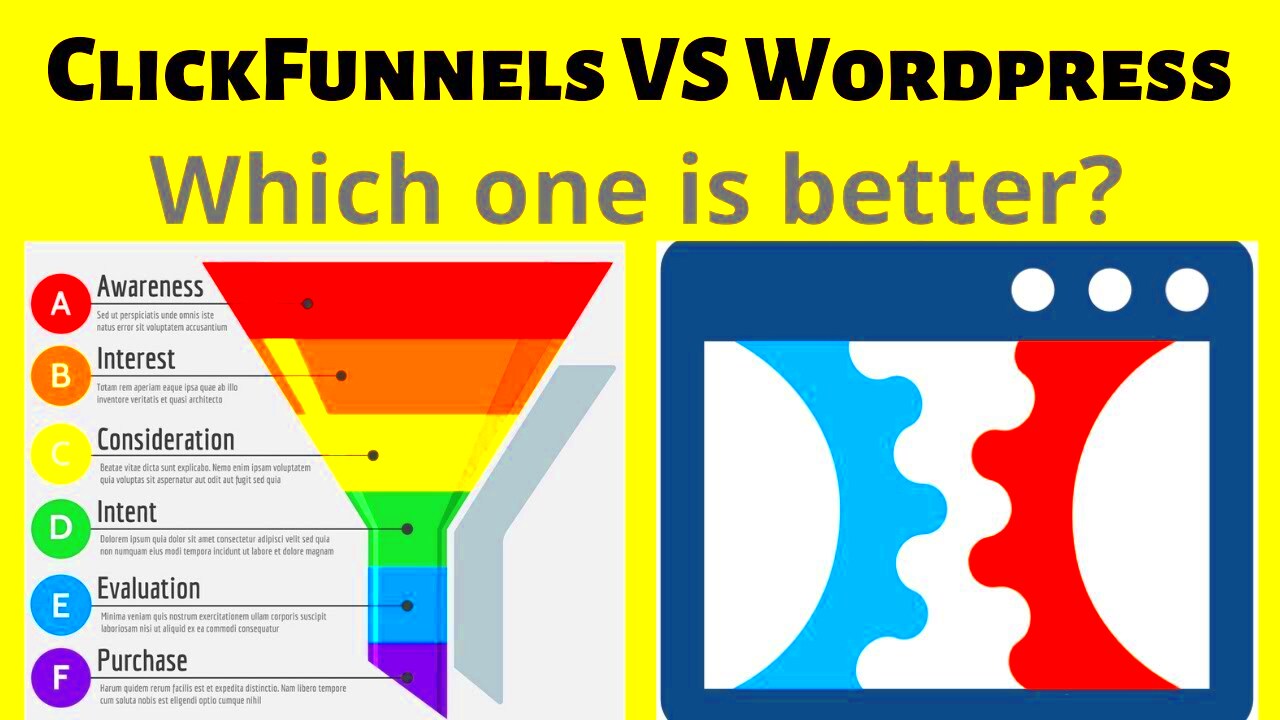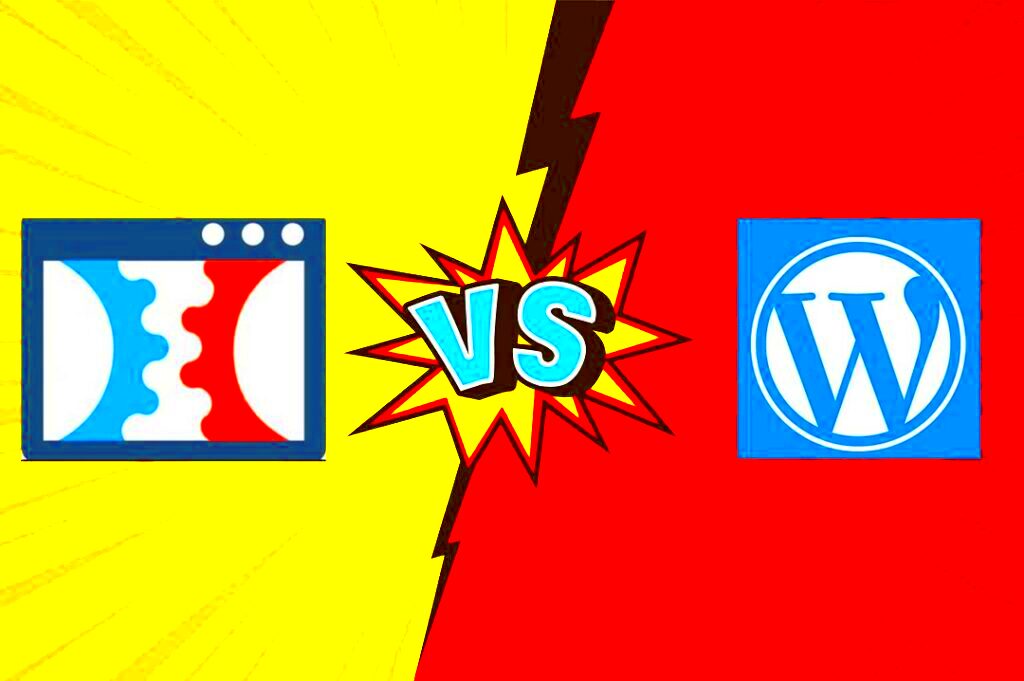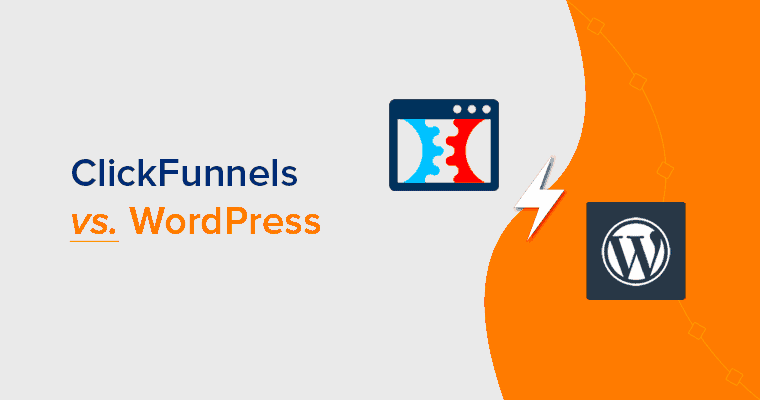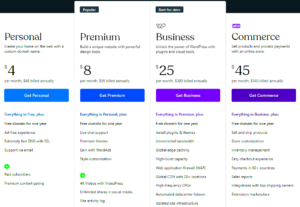Choosing the right platform for your online business can feel like navigating a maze. With so many options out there, it’s easy to get overwhelmed. In this blog post, we’ll contrast two popular tools: Clickfunnels and WordPress. Each offers its own unique features and benefits, making them suitable for different types of entrepreneurs. So, whether you’re a seasoned marketer or just starting out, let’s explore which platform might be the better fit for your specific needs.
What is Clickfunnels?

Clickfunnels is an online sales funnel builder designed to simplify the process of converting visitors into customers. Founded by Russell Brunson in 2014, Clickfunnels aims to help businesses create high-converting sales funnels without needing extensive technical or design skills. But what does that actually mean? Let’s break it down:
- User-Friendly Interface: Clickfunnels is designed for convenience. Its drag-and-drop editor allows users to create pages easily without coding knowledge.
- Sales Funnels: The primary focus of Clickfunnels is to help you design and manage entire sales funnels—from landing pages to thank you pages—capturing leads and driving sales.
- Pre-Built Templates: It comes with a variety of high-converting templates that can be customized to fit your brand, saving you time in the design process.
- Email Marketing Integration: With built-in email marketing capabilities, Clickfunnels allows you to nurture leads directly from your funnel.
- Analytics and Tracking: Analytics tools are included to help you track the performance of your funnels and optimize them over time.
So, whether you’re launching a new product or trying to capture more leads, Clickfunnels provides the tools to streamline your sales process effectively. But is it the right choice for you? Let’s dive deeper into what you need in a platform before making that decision.
What is WordPress?

WordPress is a highly popular content management system (CMS) that allows users to create, manage, and publish content online with ease. Originally launched in 2003 as a simple blogging platform, WordPress has evolved into one of the most versatile website-building tools available today. It powers over 40% of all websites on the internet, making it a go-to solution for businesses, bloggers, and creatives alike.
One of the key features of WordPress is its open-source nature. This means that users can modify the core code, customize their site to meet specific needs, and even contribute to the development of the platform. With thousands of themes and plugins available, users can create everything from simple blogs to complex e-commerce sites without needing extensive coding knowledge.
Here are a few standout features of WordPress:
- User-Friendly Interface: Even beginners can navigate the dashboard with ease.
- SEO-Friendly: Built-in features and plugins help optimize content for search engines.
- Themes and Plugins: Expand functionality and design with numerous customizable options.
- Content Control: Full ownership of your content, unlike some hosted platforms.
- Community Support: A vast network of developers and users ready to help.
In summary, WordPress is not just a blogging tool; it’s a robust CMS capable of handling diverse website types. If you’re looking to create a unique online presence with flexibility and creative control, WordPress might just be the platform you need.
Comparative Analysis of Clickfunnels and WordPress

When considering whether to use Clickfunnels or WordPress for your online business, it’s essential to weigh their strengths and weaknesses. Each platform has its own unique offerings which cater to different types of users and business models. Let’s break down some of the critical points of comparison!
| Feature | Clickfunnels | WordPress |
|---|---|---|
| Purpose | Designed primarily for funnel building and sales. | A robust CMS for creating various types of content. |
| Ease of Use | Intuitive drag-and-drop interface suited for sales funnels. | Easy to learn, but can become complex with plugins. |
| Cost | Monthly subscription fee ranging from $147 to $297. | Cost varies based on hosting, themes, and plugins (often cheaper). |
| SEO Capabilities | Limited SEO features. | Extensive SEO tools and plugins available. |
| Customization | Limited to pre-built templates. | Highly customizable with numerous themes and plugins. |
In conclusion, the choice between Clickfunnels and WordPress really depends on your business goals:
- If you’re primarily focused on sales funnels and lead generation, Clickfunnels could be your best bet.
- If you want a versatile platform that allows for greater customization and control over your content, WordPress is likely the way to go.
Ultimately, understanding the unique features and capabilities of each platform will help you make an informed decision that aligns with your specific needs!
5. Ease of Use

When it comes to choosing a platform, ease of use is often a deciding factor. After all, if a tool is complicated, it can lead to frustration and wasted time. Let’s break down how Clickfunnels and WordPress fare in this department.
Clickfunnels: This platform is designed with the user in mind. Its interface is intuitive, enabling users—whether experienced marketers or complete newbies—to create sales funnels with relative ease. The drag-and-drop editor allows you to build pages visually, which is a huge plus for those who may not have coding skills. Plus, Clickfunnels comes with pre-built funnel templates tailored for various industries, which can save you a lot of time and effort.
WordPress: On the other hand, WordPress is a powerhouse that offers unparalleled flexibility, but that can come with a steeper learning curve. If you’re starting from scratch, things like themes, plugins, and settings can feel overwhelming. Even though there are many tutorials available, navigating the complexities of WordPress can take some patience. However, once you get the hang of it, you’ll find that WordPress can be incredibly powerful.
Summary:
- Clickfunnels: User-friendly, intuitive design, drag-and-drop editor, pre-built templates.
- WordPress: Flexible but has a steeper learning curve, requires patience, rich in features.
6. Customization and Flexibility
When it comes to customizing your website or sales funnel, both Clickfunnels and WordPress offer unique benefits, but they cater to different needs and preferences.
Clickfunnels: This tool shines when it comes to creating sales funnels quickly. It provides a variety of features designed specifically for funnel creation, such as landing pages, order forms, and email integrations. However, customization options are somewhat limited compared to WordPress. While you can modify templates to some extent, you may find it challenging to implement advanced designs or functionality without diving into code. For users focused primarily on sales funnels, Clickfunnels does a fantastic job without needing extensive customization.
WordPress: If customization and flexibility are what you’re after, WordPress is almost unmatched. With thousands of themes and plugins available, you can reshape and enhance your website in virtually any way imaginable. From e-commerce functionality to membership sites, WordPress can accommodate a wide variety of needs. However, with great power comes great responsibility—more customization options mean a more complex setup process. Finding the right combination of plugins can be time-consuming and sometimes lead to compatibility issues.
Summary:
| Feature | Clickfunnels | WordPress |
|---|---|---|
| Customization | Extensive customization capabilities with themes and plugins. | |
| Flexibility | Focused on sales funnel creation. | Highly flexible for various types of websites and businesses. |
7. Cost Comparison
When it comes to choosing between Clickfunnels and WordPress, cost is a major factor that many entrepreneurs and business owners consider. Understanding how each platform affects your wallet can make your decision easier.
Clickfunnels is a subscription-based service. They offer various plans, ranging from:
- Basic Plan: Around $97/month, which includes the fundamentals of funnel building and email integration.
- Platinum Plan: Approximately $297/month, which adds features like affiliate management and additional funnels.
While Clickfunnels streamlines the funnel building process, the monthly subscription can add up over time, especially for small businesses or entrepreneurs just starting out.
On the other hand, WordPress is free to use at its core. You do pay for hosting, which can range from about $5 to $50 per month, depending on your chosen hosting provider. There are further costs associated if you want to opt for premium themes or plugins, which can range from $20 to several hundred dollars. Overall, WordPress can offer a more budget-friendly solution, especially if you’re willing to invest the time to learn the platform.
To put it simply, here’s a quick comparison:
| Platform | Starting Cost | Ongoing Costs |
|---|---|---|
| Clickfunnels | $97/month | Monthly subscription fees |
| WordPress | $5/month (hosting) | Varied costs for themes/plugins |
Choosing between Clickfunnels and WordPress essentially comes down to what you’re willing to spend and the value each platform brings to your business.
8. SEO Capabilities
Now let’s dive into SEO capabilities, which is crucial for driving organic traffic to your website. Both Clickfunnels and WordPress have different strengths in this area.
WordPress is widely regarded as one of the best platforms for SEO. It’s built with SEO in mind and offers various plugins, like Yoast SEO, that allow you to optimize your content easily. Here are some key features:
- Custom Permalinks: You can create user-friendly URLs that are better for both users and search engines.
- Meta Data Control: You have the option to edit meta titles and descriptions.
- Mobile Optimization: Many themes are responsive and mobile-friendly, which Google favors.
- Content Management: WordPress makes it easy to produce and manage quality content, which is essential for SEO.
In contrast, Clickfunnels has limited SEO features. While it allows for basic SEO settings, such as title and descriptions, it does not offer extensive control over customizations. This limits your ability to optimize for different keywords and can hinder your chances of ranking well on Google. Additionally, Clickfunnels is more focused on driving conversions through sales funnels rather than optimized content, which is not entirely SEO-focused.
In summary, if SEO is a top priority for your business, WordPress may be the better choice due to its extensive capabilities. Clickfunnels might still work for lead generation, but it lacks the in-depth SEO features that can truly elevate a website’s visibility in search engines.
Integration with Other Tools
When it comes to building a seamless online presence, the ability to integrate with other tools is crucial. Both Clickfunnels and WordPress come with their own set of advantages and limitations regarding integrations, and understanding these can help you make an informed decision about which platform suits your needs better.
Clickfunnels is designed with sales funnels in mind. It offers a built-in integration with various payment processors like Stripe and PayPal, making it easier to manage payments and subscriptions directly within your funnel. Additionally, Clickfunnels integrates well with email marketing platforms like Mailchimp, ActiveCampaign, and AWeber, which can help you automate your marketing efforts efficiently. However, it’s important to note that Clickfunnels has a more limited open API compared to WordPress. If you’re looking for robust customization, you may find Clickfunnels slightly restrictive.
On the flip side, WordPress is renowned for its flexibility and vast array of integrations. Whether you need tools for SEO, e-commerce, or social media, there’s likely a plugin that can facilitate this. For instance, WooCommerce can transform your WordPress website into a fully functional e-commerce platform, and you can easily connect various CRM tools, analytics platforms, and membership plugins. This extensive library enables users to tailor their websites as per their specific requirements. However, the downside is that with so many options, it may take longer to find and configure the right combination of tools.
In summary, if direct sales funnel integration is your priority, Clickfunnels might have the edge. However, if you’re looking for broader integration capabilities for different functions, WordPress will likely be the better option.
Support and Community
When you’re navigating the complexities of building an online presence, having solid support is essential. Both Clickfunnels and WordPress offer various resources, but they approach support differently, and your preference may significantly influence your choice.
Clickfunnels provides a centralized support system, including live chat, email support, and an extensive knowledge base. Users can access a plethora of tutorials, webinars, and a dedicated community of Clickfunnels users. The community is active, especially on social media platforms like Facebook, where users share experiences, tips, and troubleshoot issues together. While you may not find support as extensive as some large platforms, Clickfunnels excels in ensuring that users understand their sales funnel tool effectively.
On the other hand, WordPress boasts an enormous global community, given that it’s open-source software. This means you have countless forums, blogs, and YouTube channels dedicated to WordPress support. Users can find help for just about any issue imaginable—ranging from simple plugin conflicts to more complex coding questions. However, since WordPress is not a single product but rather a platform with thousands of themes and plugins, the quality of support can vary significantly. Some plugins have excellent documentation and support, while others might leave you in the dark.
To sum it up, if you prefer structured support with direct communication, Clickfunnels may be the better fit. If you thrive in a vast community and don’t mind digging for answers, WordPress could be your best bet. Ultimately, assessing what kind of support you appreciate more will guide you in your decision-making process.
Recommended Use Cases
When it comes to choosing between ClickFunnels and WordPress, it’s essential to consider your specific needs and goals. Both platforms cater to different use cases and can significantly impact your online presence. Here’s a breakdown of recommended use cases for each:
ClickFunnels
- Sales Funnels: ClickFunnels is designed specifically for creating sales funnels that guide users through a specific purchasing journey. If your primary goal is to optimize conversions and maximize sales, ClickFunnels is your ideal partner.
- Online Courses: For those looking to sell online courses or membership sites, ClickFunnels has built-in features to create and manage these offerings. It streamlines the entire process from sign up to content delivery.
- Webinars: Hosting webinars can be effortlessly managed through ClickFunnels. The platform allows you to automate registrations, reminders, and follow-ups, making it easier to run successful webinars.
- Rapid Campaign Launch: If you need to launch marketing campaigns quickly, ClickFunnels provides a range of templates and tools that enable efficient setup and deployment.
WordPress
- Blogs and Content-Heavy Sites: When it comes to blogging or running content-heavy sites, WordPress provides unparalleled flexibility and ease of use. You can create beautiful, rich content that can easily be indexed by search engines.
- E-commerce Stores: WordPress, especially with WooCommerce, offers a robust solution for e-commerce. You can create a fully-functional online store with comprehensive product management features.
- Custom Websites: If you’re looking at building a fully customized website, WordPress is incredibly versatile, allowing for detailed changes and integrations that suit specific needs.
- SEO Optimization: WordPress offers excellent SEO plugins and flexibility that make it easier for your website to rank higher in search engine results.
Ultimately, the best choice depends on your specific requirements and business objectives.
Conclusion
Choosing between ClickFunnels and WordPress ultimately boils down to what you’re trying to achieve. Each platform has its own strengths and weaknesses, making it critical to analyze your needs closely before making a decision.
ClickFunnels is the go-to option for marketers and business owners aiming to create high-converting sales funnels quickly. It offers integrated tools for upsells, downsells, and A/B testing that can enhance your conversion rates significantly. However, it comes at a cost and has a steeper learning curve if you’re unfamiliar with funnel-building techniques.
| Feature | ClickFunnels | WordPress |
|---|---|---|
| Ease of Use | Moderate | Easy to Moderate |
| Customization | Limited | Highly Customizable |
| Cost | Subscription Model | Variable (Hosting fees, plugins) |
| SEO Features | Basic | Advanced |
On the other hand, WordPress shines in versatility and is better suited for content-driven websites or those requiring extensive customization. It provides more comprehensive control over your website’s design and function, with a plethora of plugins to enhance almost every aspect of your setup, including e-commerce and SEO.
In conclusion, if your priority is funnel creation, conversions, and online sales, ClickFunnels might be the better choice. However, if you seek a content-heavy site with extensive customization and SEO capabilities, WordPress is the way to go. Ultimately, weigh your options and select the platform that aligns with your vision and business model.



